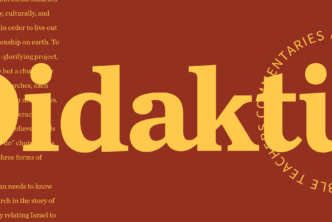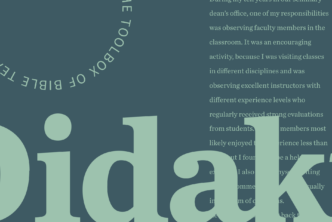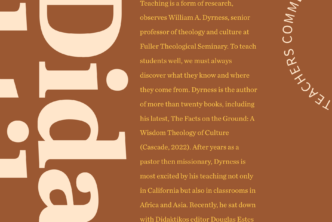Integrate Knowledge and Praxis Through Contextual Teaching and Learning
Kristen Ferguson | Gateway Seminary
If information automatically led to transformation, then it would be easy. We could upload our fact-filled videos, pour ourselves another cup of coffee, and wait for the metamorphosis. Intentional training demands more. Communicating facts is one thing, but fostering transformation, mentorship, and relational skills necessary for ministry leaders is another.1 Since all types of learning outcomes—cognitive, behavioral, and affective—are essential for all theological education,2 we must not settle for merely cognitive results in online theological education.
One way to develop students in all three learning domains3 is to plan strategic opportunities for contextual teaching and learning (CTL)—an instructional system that “engages students in significant activities that help them connect academic studies to their context in real-life situations.”4 When we can connect the subject matter in our class to the students’ context, they see the importance and usefulness of the content being taught. As an andragogical approach, CTL helps students relate contextual experiences to course content and promotes active participation in learning.5
In the online environment, learning and teaching contextually requires that concepts be experienced and applied to the real world. Whether the teacher includes real-world examples in their lessons or assigns students to engage in activities outside the classroom, many disciplines utilize CTL to enhance the connection between concepts and application. For example, a math teacher might demonstrate a parabola by shooting a basketball into a hoop. A science teacher might require students to visit a polluted area or a recycling center. A language teacher might assign students to interview someone who speaks the language fluently. In a theological education setting, contextual teaching and learning might include students discipling someone for the duration of the class, immersing themselves in a different cultural environment, interviewing an expert or layperson from their church, or finding real examples of course content in his or her own city. These offline activities, when done with planning and forethought, can increase student learning in your online course.
Although the unknown and uncontrollable factors in the myriad of contexts represented by online students can certainly be intimidating, the truth is, online education offers some of the richest opportunities for a wide range of experiences. Because online students are located in a variety of contexts, the class can see a broader application of the course content. Using the following guidelines for contextual assignments, teachers can infuse a course with contextual experiences that encourage the holistic development of the student.
Instructions should be clear and precise.
Since students will be expected to complete the activity apart from your physical presence, the instructions provided should include every necessary detail. Consider including specifics such as: the length of time students should spend in context; the number of people they should engage; a requirement to document their activity by retrieving artifacts or taking photos; and the elements they should be prepared to discuss in class. Give students enough time to plan and execute their contextual activity and be available for questions.
Activities should be reasonably achievable in any context.
Requiring students to visit a Taiwanese community might be fine for students in major cities, but will you expect someone to travel a great distance to accomplish the task if they live in a rural setting? You won’t be able to guess every possible context in which your students are planted, but you can design the activity to be broad enough to be reasonably achievable regardless of their contextual limitations. For students in extremely unusual contexts, you can always have an alternative experience that achieves the same objective.
Assignments should be tied to course learning objectives.
Speaking of objectives, ensure that your contextual assignment is tied to a stated learning objective in your syllabus. Especially for adult learners, the more immediately applicable the assignment seems, the more willingly the student will delve deeply into the experience. The final product of the experience should clearly accomplish a primary purpose of the course. If not, it will likely become burdensome busywork for the student.
Students should engage one another with process and results.
Whether students provide updates along the way or one major summary after the activity, requiring peer-to-peer interaction about the experience will broaden each student’s view of the applied content. Leveraging the variety of contexts among students, you can expose your class to different facets of how course content can be useful in the real world as they discuss the assignment together. Sharing photos, asking questions, and comparing/contrasting experiences are some of the best ways for students to get the most of out of a contextual activity.
Instructors should guide conclusions derived from contextual experiences.
With a variety of contexts, there are bound to be a variety of conclusions students draw from contextual learning activities. You can help students arrive at pertinent answers and reflections that matter to the course objectives. Highlight the important points mentioned in student discussions, summarize important questions and considerations in an email, or bring the assignment to a close with a short video. Remind students why they completed the activity and what they were supposed to glean from it.
By getting your online students offline, you can enhance the quality of their learning. You can offer them well-designed opportunities to engage their context, learn from one another’s context, and apply the content in ways that will make a lasting difference. Who knows—genuine transformation may grow out of your efforts! Something to think about as you pour yourself another cup of coffee.
Kristen Ferguson (EdD, Southern Baptist Theological Seminary) is director of online education and assistant professor of educational leadership at Gateway Seminary. Her research interests include best practices for online education and development strategies for online faculty.
Want more great articles like this delivery to you in print every quarter? Sign up for Didaktikos: Journal of Theological Education today.

- Kristen Ann Ferguson, “Evangelical Faculty Perceptions of Online Learning in Graduate-Level Theological Education” (EdD diss., Southern Baptist Theological Seminary, Lousiville, KY, 2016), 152, ProQuest Dissertations & Theses Global.
- LeRoy Ford, A Curriculum Manual for Theological Education (Nashville: Broadman, 1991), 223–45.
- Benjamin S. Bloom, ed., Taxonomy of Educational Objectives: The Classification of Educational Goals, Handbook I: Cognitive Domain (New York: David McKay, 1956), 7–8.
- Elaine Johnson, Contextual Teaching and Learning: What It Is and Why It’s Here to Stay (Thousand Oaks, CA: Corwin, 2001), 3.
- Malcom S. Knowles, Elwood F. Holton III, and Richard A. Swanson, The Adult Learner: The Definitive Classic in Adult Education and Human Resource Development, 5th ed. (New York: Routledge, 2015), 175–79.





